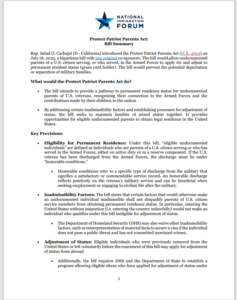 Rep. Salud O. Carbajal (D – California) introduced the Protect Patriot Parents Act (H.R. 4694) on July 18, 2023, a bipartisan bill with two original co-sponsors. The bill would allow undocumented parents of a U.S. citizen serving, or who served, in the Armed Forces to apply for and adjust to permanent resident status (green card holder). The bill would prevent the potential deportation or separation of military families.
Rep. Salud O. Carbajal (D – California) introduced the Protect Patriot Parents Act (H.R. 4694) on July 18, 2023, a bipartisan bill with two original co-sponsors. The bill would allow undocumented parents of a U.S. citizen serving, or who served, in the Armed Forces to apply for and adjust to permanent resident status (green card holder). The bill would prevent the potential deportation or separation of military families.
What would the Protect Patriot Parents Act do?
- The bill intends to provide a pathway to permanent residence status for undocumented parents of U.S. veterans, recognizing their connection to the Armed Forces and the contributions made by their children to the nation.
- By addressing certain inadmissibility factors and establishing processes for adjustment of status, the bill seeks to maintain families of mixed status together. It provides opportunities for eligible undocumented parents to obtain legal residence in the United States.
Key Provisions
- Eligibility for Permanent Residence: Under this bill, “eligible undocumented individuals” are defined as individuals who are parents of a U.S. citizen serving or who has served in the Armed Forces, either on active duty or in a reserve component. If the U.S. veteran has been discharged from the Armed Forces, the discharge must be under “honorable conditions.”
- Honorable conditions refer to a specific type of discharge from the military that signifies a satisfactory or commendable service record. An honorable discharge reflects positively on the veteran’s military service and can be beneficial when seeking employment or engaging in civilian life after the military.
- Inadmissibility Factors: The bill states that certain factors that would otherwise make an undocumented individual inadmissible shall not disqualify parents of U.S. citizen service members from obtaining permanent residence status. In particular, entering the United States without inspection (i.e. entering the country unlawfully) would not make an individual who qualifies under this bill ineligible for adjustment of status.
- The Department of Homeland Security (DHS) may also waive other inadmissibility factors, such as misrepresentation of material facts to secure a visa if the individual does not pose a public threat and has not committed unrelated crimes.
- Adjustment of Status: Eligible individuals who were previously removed from the United States or left voluntarily before the enactment of this bill may apply for adjustment of status from abroad.
- Additionally, the bill requires DHS and the Department of State to establish a program allowing eligible aliens who have applied for adjustment of status under this bill to be admitted into the U.S. as nonimmigrants while their application is pending.
- This admission is contingent upon a determination by DHS and the State Department that the individual does not pose a threat to public or national security.
What challenges will the Protect Patriot Parents Act address?
- Passing the Protect Patriot Parents Act would offer a positive step forward, providing a clearly defined pathway to citizenship for mixed-status military families. This would enable parents to stay together with their children and gain refuge in the United States.
- Mixed-status families, where some members are undocumented and others are U.S. citizens or lawful permanent residents, face the risk of separation due to the immigration status of certain family members.
- There are approximately 80,000 undocumented spouses and parents of U.S. military service members and veterans currently living in the United States.
- While U.S. Citizenship and Immigration Services (USCIS) offers limited discretionary protections, such as “parole in place,” these protections are granted on a case-by-case basis and may take time to process. Fear of denial and family separation may discourage eligible individuals from applying for these protections.
- The uncertainty and fear of deportation and family separation have detrimental impacts on military readiness and the overall well-being of service members. Parents play a significant role in supporting the spouses and children who are service members. Acknowledging the unique challenges that are faced by mixed-status families is important. When the service member is away on duty and deployment, mixed-status grandparents can step in to provide childcare. This assistance can be invaluable in alleviating stress for the spouse who may need additional support during the service member’s absence.
The National Immigration Forum would like to thank Arlene Gyimah, Policy and Advocacy Intern, for developing this bill summary.

